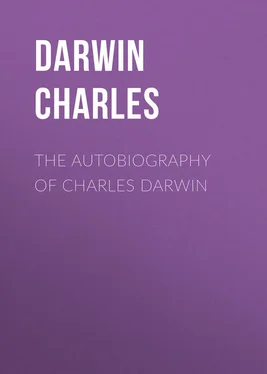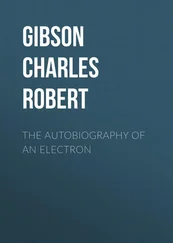Charles Darwin - The Autobiography of Charles Darwin
Здесь есть возможность читать онлайн «Charles Darwin - The Autobiography of Charles Darwin» — ознакомительный отрывок электронной книги совершенно бесплатно, а после прочтения отрывка купить полную версию. В некоторых случаях можно слушать аудио, скачать через торрент в формате fb2 и присутствует краткое содержание. Жанр: foreign_antique, foreign_prose, на английском языке. Описание произведения, (предисловие) а так же отзывы посетителей доступны на портале библиотеки ЛибКат.
- Название:The Autobiography of Charles Darwin
- Автор:
- Жанр:
- Год:неизвестен
- ISBN:нет данных
- Рейтинг книги:5 / 5. Голосов: 1
-
Избранное:Добавить в избранное
- Отзывы:
-
Ваша оценка:
- 100
- 1
- 2
- 3
- 4
- 5
The Autobiography of Charles Darwin: краткое содержание, описание и аннотация
Предлагаем к чтению аннотацию, описание, краткое содержание или предисловие (зависит от того, что написал сам автор книги «The Autobiography of Charles Darwin»). Если вы не нашли необходимую информацию о книге — напишите в комментариях, мы постараемся отыскать её.
The Autobiography of Charles Darwin — читать онлайн ознакомительный отрывок
Ниже представлен текст книги, разбитый по страницам. Система сохранения места последней прочитанной страницы, позволяет с удобством читать онлайн бесплатно книгу «The Autobiography of Charles Darwin», без необходимости каждый раз заново искать на чём Вы остановились. Поставьте закладку, и сможете в любой момент перейти на страницу, на которой закончили чтение.
Интервал:
Закладка:
Charles Darwin
The Autobiography of Charles Darwin
[My father's autobiographical recollections, given in the present chapter, were written for his children, – and written without any thought that they would ever be published. To many this may seem an impossibility; but those who knew my father will understand how it was not only possible, but natural. The autobiography bears the heading, 'Recollections of the Development of my Mind and Character,' and end with the following note: – "Aug. 3, 1876. This sketch of my life was begun about May 28th at Hopedene (Mr. Hensleigh Wedgwood's house in Surrey.), and since then I have written for nearly an hour on most afternoons." It will easily be understood that, in a narrative of a personal and intimate kind written for his wife and children, passages should occur which must here be omitted; and I have not thought it necessary to indicate where such omissions are made. It has been found necessary to make a few corrections of obvious verbal slips, but the number of such alterations has been kept down to the minimum. – F.D.]
A German Editor having written to me for an account of the development of my mind and character with some sketch of my autobiography, I have thought that the attempt would amuse me, and might possibly interest my children or their children. I know that it would have interested me greatly to have read even so short and dull a sketch of the mind of my grandfather, written by himself, and what he thought and did, and how he worked. I have attempted to write the following account of myself, as if I were a dead man in another world looking back at my own life. Nor have I found this difficult, for life is nearly over with me. I have taken no pains about my style of writing.
I was born at Shrewsbury on February 12th, 1809, and my earliest recollection goes back only to when I was a few months over four years old, when we went to near Abergele for sea-bathing, and I recollect some events and places there with some little distinctness.
My mother died in July 1817, when I was a little over eight years old, and it is odd that I can remember hardly anything about her except her death-bed, her black velvet gown, and her curiously constructed work-table. In the spring of this same year I was sent to a day-school in Shrewsbury, where I stayed a year. I have been told that I was much slower in learning than my younger sister Catherine, and I believe that I was in many ways a naughty boy.
By the time I went to this day-school (Kept by Rev. G. Case, minister of the Unitarian Chapel in the High Street. Mrs. Darwin was a Unitarian and attended Mr. Case's chapel, and my father as a little boy went there with his elder sisters. But both he and his brother were christened and intended to belong to the Church of England; and after his early boyhood he seems usually to have gone to church and not to Mr. Case's. It appears ("St. James' Gazette", Dec. 15, 1883) that a mural tablet has been erected to his memory in the chapel, which is now known as the 'Free Christian Church.') my taste for natural history, and more especially for collecting, was well developed. I tried to make out the names of plants (Rev. W.A. Leighton, who was a schoolfellow of my father's at Mr. Case's school, remembers his bringing a flower to school and saying that his mother had taught him how by looking at the inside of the blossom the name of the plant could be discovered. Mr. Leighton goes on, "This greatly roused my attention and curiosity, and I enquired of him repeatedly how this could be done?" – but his lesson was naturally enough not transmissible. – F.D.), and collected all sorts of things, shells, seals, franks, coins, and minerals. The passion for collecting which leads a man to be a systematic naturalist, a virtuoso, or a miser, was very strong in me, and was clearly innate, as none of my sisters or brother ever had this taste.
One little event during this year has fixed itself very firmly in my mind, and I hope that it has done so from my conscience having been afterwards sorely troubled by it; it is curious as showing that apparently I was interested at this early age in the variability of plants! I told another little boy (I believe it was Leighton, who afterwards became a well-known lichenologist and botanist), that I could produce variously coloured polyanthuses and primroses by watering them with certain coloured fluids, which was of course a monstrous fable, and had never been tried by me. I may here also confess that as a little boy I was much given to inventing deliberate falsehoods, and this was always done for the sake of causing excitement. For instance, I once gathered much valuable fruit from my father's trees and hid it in the shrubbery, and then ran in breathless haste to spread the news that I had discovered a hoard of stolen fruit.
I must have been a very simple little fellow when I first went to the school. A boy of the name of Garnett took me into a cake shop one day, and bought some cakes for which he did not pay, as the shopman trusted him. When we came out I asked him why he did not pay for them, and he instantly answered, "Why, do you not know that my uncle left a great sum of money to the town on condition that every tradesman should give whatever was wanted without payment to any one who wore his old hat and moved [it] in a particular manner?" and he then showed me how it was moved. He then went into another shop where he was trusted, and asked for some small article, moving his hat in the proper manner, and of course obtained it without payment. When we came out he said, "Now if you like to go by yourself into that cake-shop (how well I remember its exact position) I will lend you my hat, and you can get whatever you like if you move the hat on your head properly." I gladly accepted the generous offer, and went in and asked for some cakes, moved the old hat and was walking out of the shop, when the shopman made a rush at me, so I dropped the cakes and ran for dear life, and was astonished by being greeted with shouts of laughter by my false friend Garnett.
I can say in my own favour that I was as a boy humane, but I owed this entirely to the instruction and example of my sisters. I doubt indeed whether humanity is a natural or innate quality. I was very fond of collecting eggs, but I never took more than a single egg out of a bird's nest, except on one single occasion, when I took all, not for their value, but from a sort of bravado.
I had a strong taste for angling, and would sit for any number of hours on the bank of a river or pond watching the float; when at Maer (The house of his uncle, Josiah Wedgwood.) I was told that I could kill the worms with salt and water, and from that day I never spitted a living worm, though at the expense probably of some loss of success.
Once as a very little boy whilst at the day school, or before that time, I acted cruelly, for I beat a puppy, I believe, simply from enjoying the sense of power; but the beating could not have been severe, for the puppy did not howl, of which I feel sure, as the spot was near the house. This act lay heavily on my conscience, as is shown by my remembering the exact spot where the crime was committed. It probably lay all the heavier from my love of dogs being then, and for a long time afterwards, a passion. Dogs seemed to know this, for I was an adept in robbing their love from their masters.
I remember clearly only one other incident during this year whilst at Mr. Case's daily school, – namely, the burial of a dragoon soldier; and it is surprising how clearly I can still see the horse with the man's empty boots and carbine suspended to the saddle, and the firing over the grave. This scene deeply stirred whatever poetic fancy there was in me.
In the summer of 1818 I went to Dr. Butler's great school in Shrewsbury, and remained there for seven years still Midsummer 1825, when I was sixteen years old. I boarded at this school, so that I had the great advantage of living the life of a true schoolboy; but as the distance was hardly more than a mile to my home, I very often ran there in the longer intervals between the callings over and before locking up at night. This, I think, was in many ways advantageous to me by keeping up home affections and interests. I remember in the early part of my school life that I often had to run very quickly to be in time, and from being a fleet runner was generally successful; but when in doubt I prayed earnestly to God to help me, and I well remember that I attributed my success to the prayers and not to my quick running, and marvelled how generally I was aided.
Читать дальшеИнтервал:
Закладка:
Похожие книги на «The Autobiography of Charles Darwin»
Представляем Вашему вниманию похожие книги на «The Autobiography of Charles Darwin» списком для выбора. Мы отобрали схожую по названию и смыслу литературу в надежде предоставить читателям больше вариантов отыскать новые, интересные, ещё непрочитанные произведения.
Обсуждение, отзывы о книге «The Autobiography of Charles Darwin» и просто собственные мнения читателей. Оставьте ваши комментарии, напишите, что Вы думаете о произведении, его смысле или главных героях. Укажите что конкретно понравилось, а что нет, и почему Вы так считаете.












